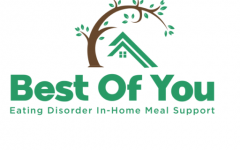Spotting the Signs of an Eating Disorder
Eating disorders are complex mental health conditions that affect millions of people worldwide, including a significant number of Canadians. They involve disordered eating behaviors and a preoccupation with food, weight, and body image, which can lead to severe physical and emotional consequences. Recognizing the signs of an eating disorder is crucial for early intervention and successful recovery.
In this article, we will explore how to identify the signs and symptoms of an eating disorder in yourself or a loved one, and when to seek professional help. If you suspect that you or someone you know may have an eating disorder, the compassionate team at Best of You is here to support and guide you on your journey to recovery.
Common Symptoms of Eating Disorders

While each eating disorder is characterized by unique symptoms and behaviors, there are some common signs that may indicate the presence of an eating disorder. These include :
Preoccupation with food, weight, and body image: Individuals with eating disorders often obsess over their diet, appearance, and weight, frequently engaging in negative self-talk or comparing themselves to others.
Changes in eating habits: Noticeable shifts in eating patterns, such as skipping meals, eating in secret, or avoiding certain food groups, can be indicative of an eating disorder.
Emotional and behavioral changes: Mood swings, irritability, social withdrawal, and increased secrecy can be warning signs of an eating disorder.
Physical symptoms: Unexplained weight loss or gain, frequent fluctuations in weight, dizziness, fainting, and signs of malnutrition are potential signs of an eating disorder.
Compulsive exercise: Engaging in excessive or compulsive exercise, even when injured or exhausted, can be a warning sign of an eating disorder.
Self-Assessment and Seeking Help

If you suspect that you or a loved one may have an eating disorder, it’s essential to seek professional help as soon as possible. Early intervention can significantly improve the chances of successful recovery and long-term wellbeing.
To begin the process, consider taking the following steps:
Self-assessment: Reflect on your thoughts, feelings, and behaviors related to food, weight, and body image. Be honest with yourself about whether your preoccupations or behaviors are causing distress or negatively affecting your daily life.
Talk to someone you trust: Share your concerns with a close friend, family member, or counselor. They can offer support, guidance,
and help you determine whether professional help is necessary.
Seek professional guidance: Reach out to a healthcare professional, such as a doctor, therapist, or registered dietitian, who specializes in eating disorders. They can provide an accurate diagnosis and recommend appropriate treatment options.
Be patient and compassionate with yourself: Remember that recovery is a journey and may take time. Be kind to yourself and acknowledge that seeking help is a courageous and essential step toward healing.
Begin Your Recovery Journey with Best of You
If you or a loved one is exhibiting signs of an eating disorder, don’t hesitate to seek help. The compassionate and experienced team at Best of You is dedicated to providing evidence-based care and support throughout your recovery journey. Contact us today to learn more about our services and take the first step toward a healthier, happier future.
In conclusion, recognizing the signs of an eating disorder is critical for early intervention and successful recovery. By familiarizing yourself with the common symptoms and being honest about your thoughts, feelings, and behaviors, you can identify when professional help is necessary.
If you or someone you know may be struggling with an eating disorder, remember that help is available. Reach out to the caring and knowledgeable team at Best of You for support and guidance on your journey to recovery. Don’t let an eating disorder control your life – act today and start your journey toward healing and wellness.





